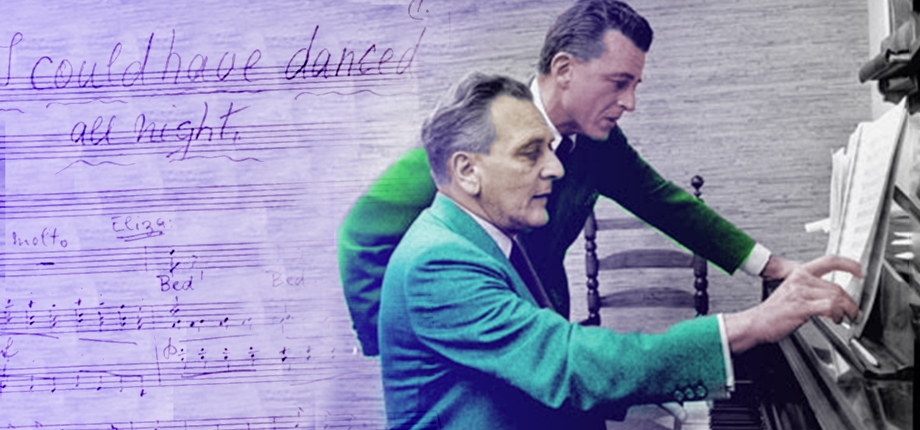Filichia Features: Paint Your Wagon: Got a Dream, Boy! Got a Song!

Filichia Features: Paint Your Wagon: Got a Dream, Boy! Got a Song!
Don’t judge it by the movie.
If you did, you’d never consider staging Paint Your Wagon at your theater.
Lerner and Loewe’s 1951 Broadway musical concerning the Old West was originally supposed to be a Cinerama release in 1953. As it turned out, Hollywood didn’t get around to filming it until 1969.
The result? Instead of a movie of great width, it became one of great length: two hours and 38 minutes -- enough time to boil more than 50 three-minute eggs.
The movie laid just about as many eggs, partly because of Lee Marvin and Clint Eastwood’s “singing” and partly because the new plot had them in a ménage à trois with Jean Seberg, who’d married Marvin but encouraged that the two men share her. Even at the end of the Swingin’ Sixties, audiences that went to see movie musicals expected unadulterated fun and not adultery.
Don’t assume that spouse swapping was a component of the original stage musical. Nor was the simple-minded (albeit cinematic) plot which has Ben (Marvin) and some miners dig beneath the town’s buildings in order to find gold that may have seeped through the various buildings’ floorboards.
(Unlike Lorelei Lee and Dorothy Shaw in Gentlemen Prefer Blondes, the gold diggers in this show are men.)
Digging underneath buildings makes every edifice cave in from above. Yeah, try replicating that on your local stage.
The film didn’t need those gimmicks, given that Brooks Atkinson, the New York Times critic who was so esteemed that Broadway eventually named a theater for him, wrote of the Broadway version “A bountiful and exultant musical jamboree … the abundance, good humor and romantic beauty of Paint Your Wagon make a very happy evening … it’s a lot of fun … a royal good time.”
However, the Mormon husband and his two wives who appear in the film were in the stage musical, too. Here too Elizabeth (Seberg) is relegated to toting luggage while the more esteemed Sarah -- mother to Jacob's child -- takes it easy, always playing the my-newborn-baby-needs-me card. So Ben buys her. (The plot was based on a man named Comstock who actually had purchased his wife from a man who didn’t want her.)
If you only know the original cast album and not the 2015 recording you don't know “Trio,” in which the Mormons talk to God. Jacob gives “thanks for all my blessings”; Sarah expresses no sympathy for Elizabeth in a nice Lerner turn of phrase: “She made her bed -- now she can't lie down.”
So Elizabeth is all too willing to be auctioned. Jacob warns her “You don't know what you'll get -- to which she rebuts “I know what I've had.”
The real complications occur because Ben has a daughter Jennifer (who wasn’t in the film). A grown daughter who’s long occupied a house with her father doesn’t often welcome his new wife into their home.
That’s enough to make Jennifer want to leave home. The miners want her to go for they can’t help noticing that time has turned her into a grown woman. One miner who lusts for Jennifer says “It's one thing missing what you ain't got; it's another thing seeing what you ain't got.”
But Lerner wrote Jennifer as a total innocent. In her marvelous first song “What’s Goin’ on Here?” she can’t understand why the men are so interested in her when she simply bends over.
So Ben decides to heed the miners and send Jennifer east. She’d like to go, too – until she meets Julio.
He’s a Mexican immigrant, which suddenly makes Paint Your Wagon topical again. One miner says “When are the Mexicans gonna learn this ain't their land anymore?” Julio reminds the new arrivals “One time this was all part of Mexico” but that doesn’t impress them.
We like Ben Rumson for being open-minded. He reminds his peers what he expects of those living in a town named after him: “Here you get accused of what you've done, not for what you are.”
Julio is grateful that Jennifer pays attention to what he says. “I talk to the trees, but they don't listen to me,” he explains in a song that has garnered a few pop recordings. And you know how love is: Jennifer is soon peppering her speech with “Gracias” and “Buenas noches.” The two opposites have attracted. We’ll see if they stay attracted.
Of the eight scores that Loewe brought to Broadway, Paint Your Wagon is arguably his most remarkable. Its robust and lusty music belies a composer born in Berlin. What a compliment to Loewe that the folk-singing group The Kingston Trio recorded both “I Talk to the Trees” and the song that insists in the West “the rain is Tess; the fire’s Joe and they call the wind Maria.”
“Maria,” incidentally, is not pronounced the way that the future Mrs. Von Trapp would say her married name or the way Tony sings it in West Side Story. Think Mariah Carey.
If you run an outdoor theater, especially one surrounded by forestry, Paint Your Wagon would be a nice fit. Here’s hoping, though, that you don’t lose performances because of a Tess storm or that your theater doesn’t burn down from Joe.
You may e-mail Peter at pfilichia@aol.com. Check out his weekly column each Monday at www.broadwayselect.com, Tuesday at www.masterworksbroadway.com and Friday at www.kritzerland.com. His book The Great Parade: Broadway’s Astonishing, Never-To-Be Forgotten 1963-1964 Season is now available at www.amazon.com.

























